Syria war: Why the battle for Aleppo matters
- Published
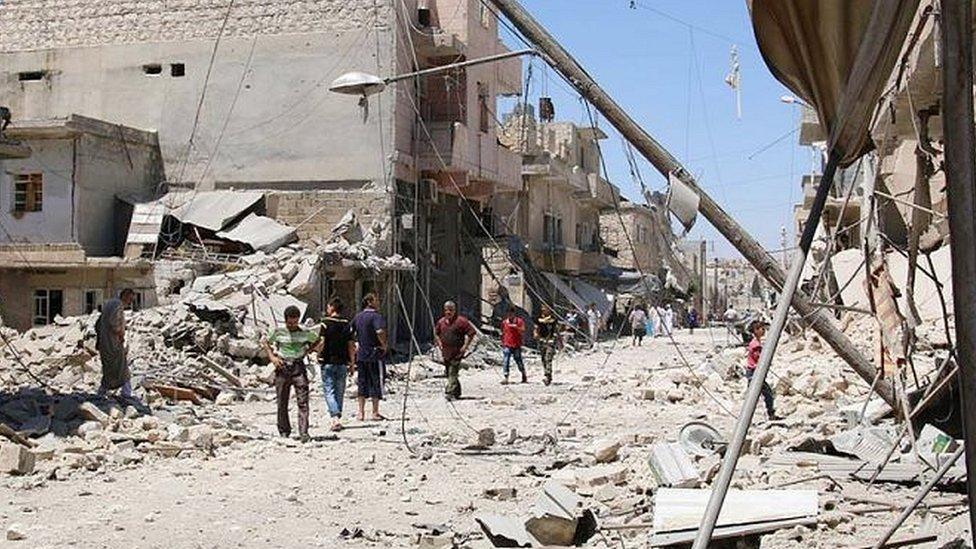
Aleppo has been largely destroyed by four years of fighting
The long battle for Syria's second city of Aleppo has entered what could be a decisive phase.
Divided between government-controlled west and rebel-held east for the past four years, fighting in the city has significantly escalated since rebel districts were encircled in July.
Here are four, key reasons why winning Aleppo is so important.
1. Supply lines
Aleppo is a key hub in the north of the country, just 30 miles (50km) from the Turkish border. As a result, control of the city delivers more than just prestige. The most important prizes are supply lines.
Armies wither without food, fuel, and weapons. In February, the Syrian government made a breakthrough when Russian air strikes helped it cut the so-called Azaz corridor, a vital rebel conduit that ran south from the Turkish town of Kilis down to Aleppo itself.
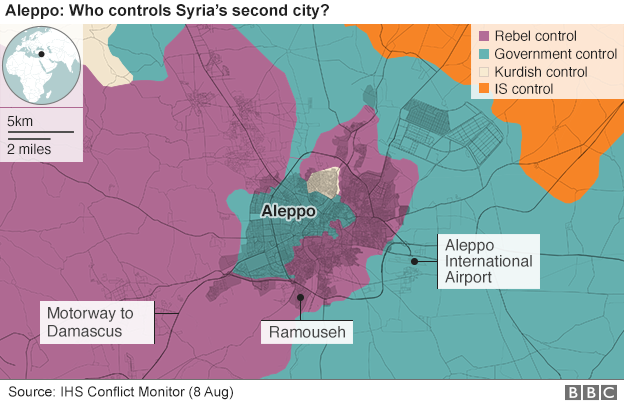
Syrian forces followed this up by taking high ground over a key road into the rebel-held east of the city, further choking off this lifeline.
When the government seemed to have boxed in its opponents, a rebel counter-attack in a key government-held district of the city, Ramouseh, suggests that the rebels might not only fight their way out, but even impose a counter-siege on the government-held west.
This would be a spectacular turnaround.
A city that for so long seemed likely to fall to the government is now very much in contention.

2. Civilians
The strategic contest may be over supply lines, but the biggest stakes are humanitarian. An estimated 250,000-300,000 civilians have been trapped in rebel-held parts of Aleppo since early July.
The Syrian government and Russia have proved willing to conduct indiscriminate aerial bombings in civilian areas, while rebels have also mounted attacks, largely by artillery, in populated areas. Hospitals have suffered especially badly, compounding the humanitarian crisis.
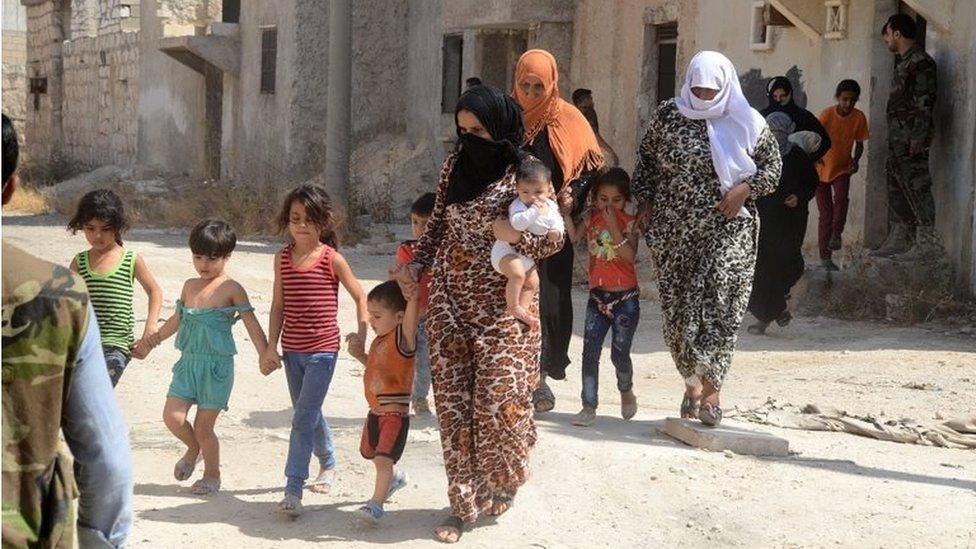
A few families have left rebel-held Aleppo through "humanitarian corridors" (Syrian state news agency picture)
If the rebels build on their gains at Ramouseh by seeking to blockade government-held areas, it could put another 1.2 million civilians in a precarious position. The skyrocketing price of food reflects this fear.
The UN and others have responded coolly to four Russian-backed "humanitarian corridors" to allow civilians to leave, fearing that these might simply facilitate intensified attacks on those who remain.
The rebels' gains now mean that they are even less likely to accept Russian proposals or respect them if implemented. And as Russian air strikes increase and western Aleppo comes under more pressure, civilians are likely to bear the brunt. This might eventually affect the Europe-bound refugee flow.

3. The opposition
The armed opposition in Aleppo includes nearly two dozen factions, grouped into different coalitions.
The largest and most powerful of these coalitions is Jaish al-Fatah (Army of Conquest), which includes within it Jabhat Fatah al-Sham, which was until mid-2016 known as Jabhat al-Nusra. It was al-Qaida's powerful front in Syria, and changed its name in order to distance itself from its notorious parent organisation, strengthen its alliances with other rebels, and avoid being targeted by Russia and the United States, which had agreed to work against it.
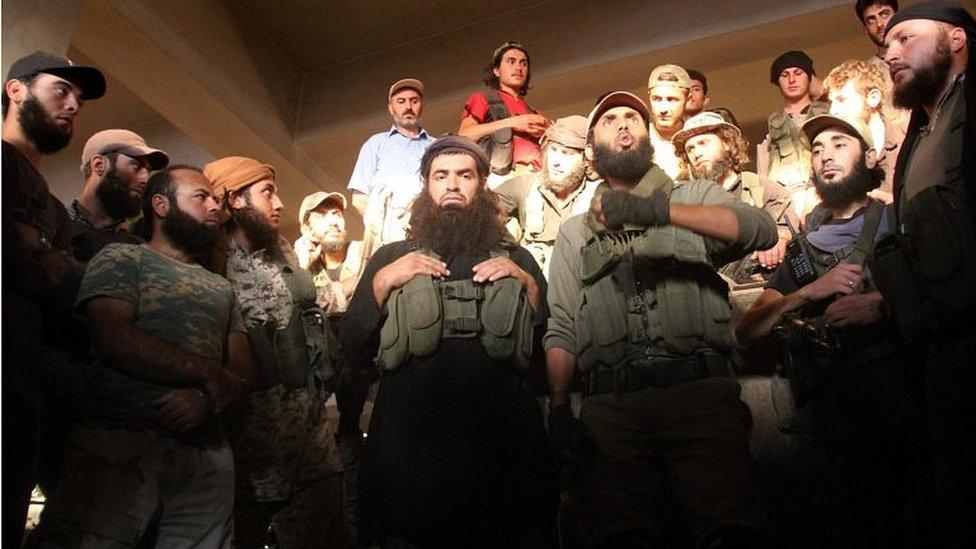
Jabhat Fatah al-Sham, formerly Nusra Front, is one of the most powerful groups fighting in Aleppo
Jaish al-Fatah and its extremist spearhead are emerging from Aleppo's battles with power and prestige, having once more proven highly effective on the battlefield.
This is a headache for Western countries, which have backed more moderate but less proficient fighters, but good news for other rebel supporters like Saudi Arabia, Qatar, and Turkey, who have embraced harder-line Islamists.
Meanwhile, Aleppo as a whole is sandwiched between so-called Islamic State (IS) to the east and Syrian Kurdish groups to the north-west. IS and Kurds have clashed with each other, and both have fought anti-Assad rebels like Jaish al-Fatah. If rebels are defeated in Aleppo, IS and Kurds might take advantage by seizing new territory.
This would alarm and provoke Turkey, which opposes President Bashar al-Assad, IS, and the Kurds. Rebel gains in and around Aleppo, on the other hand, are a boost for Turkey, Saudi Arabia and Qatar against Russia and Iran. In other words, Aleppo is a factor in regional geopolitics.

4. Cementing the stalemate?
The battle for Aleppo comes at a highly significant moment in the conflict. Russian intervention saved President Assad's forces from collapse, and then propelled them to success.
In the West, politicians switched from demanding Mr Assad's immediate departure to virtually conceding his victory.
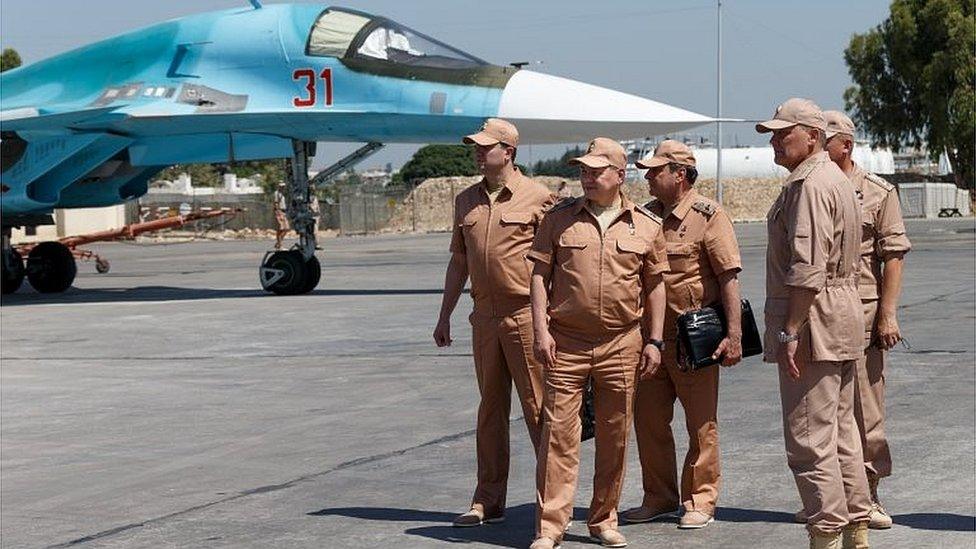
Russian military support has been crucial for President Assad
Had the rebels been crushed, Mr Assad's opponents - above all, a US administration in its final months - might have agreed to a settlement on generous terms.
Now, beleaguered rebels have demonstrated that the war is far from over. Syrian forces are exhausted, and depend on massive military support from Russian air power, militias led by Iran, and soldiers from the Lebanese group Hezbollah.
Continued success might persuade Moscow and Tehran that they, too, will have to be willing to make greater compromises if they want a way out of the conflict.
Shashank Joshi is a Senior Research Fellow at the Royal United Services Institute (Rusi) in London. He recently contributed to Rusi's Occasional Paper, Understanding Iran's Role in the Syrian Conflict. Follow him on Twitter., external